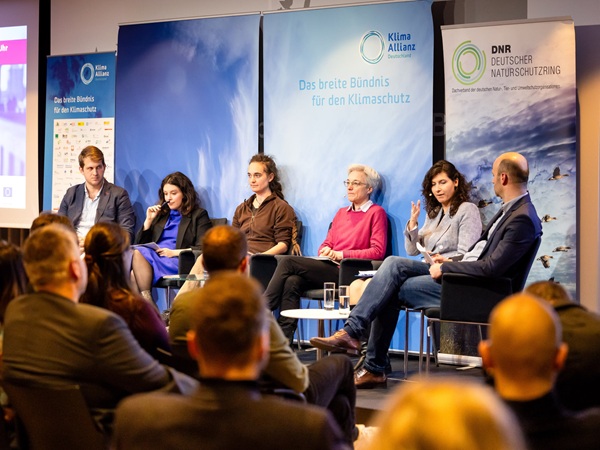Photo: Jörg Farys / Klima-Allianz Deutschland.
One of our German members followed online the January 2025 event of the Climate Alliance Germany, where more than 150 participants discussed the future of the European Green Deal. Karin Hummel reports as follows.
Summary of the #26 Berliner Klimagespräch – Europas Green Deal zukunftsfest und sozial gestalten (#26 Berlin Climate Discussion – European Green Deal how to Make it Future Proof and Socially Acceptable)
Climate Alliance Germany is Germany’s broad civil society alliance for climate justice. They count more than 150 organizations from the fields of environment, church and other religious groups, development, education, culture, health, consumer protection, youth, trade unions, and social welfare. Discussions on climate topics with various parties are organized 4 times a year. The Omas for Future Germany are members of the organization.
The January 2025 Meeting dealt with the future of the Green Deal and how to make it socially acceptable.
In her key note Yvon Slingenberg (Director of Strategy, Analyssis and Planning in the European Commission’s Directorate-General for Climate Action) was positive that the EU will achieve its goal for 2030. She also emphasized that there is still need for action on the national climate and energy plans of the member states. She would like to see Germany as champion for investments in Europe.
Participants were MEPs from the Green Party in Germany, the Social Democrats, the left party as well as the director of the institute Zukunft KlimaSozial which works on solutions for a climate neutral and socially just future, and a member of Germanwatch responsible for EU Climate Policy. A member of the EPP was invited but did not attend.
The participants agreed that economic competitiveness is key for the new commission. A challenge is the Clean Deal Industrial Plan as the successor of the Grean Deal. Given the turbulences politically (Trump in US, rise of right parties in EU member states) there is a risk that the planned reduction of bureaucracy by streamlining of reporting will result in decreased standards of nature protection. Even though some goals have been achieved by the Green Deal so far it is not sufficient to reach the climate goals.
The energy sector will be the first one to decarbonize. However, high investments will be needed. These Investments are to be done via public and private financing. Public funding should only be used to decrease the finance risks. A new innovation fund could use money from the carbon trade.
Buildings and transportation are areas where a lot still has to be done especially in Germany as the largest emitter of CO2 in the EU. Any measures taken need to respect the reality of the life of the people and follow the principle „Leave no one behind“. A social climate fund starting in 2026 will help here but is probably not sufficient. The affordability of measures to be taken will determine the acceptability.
